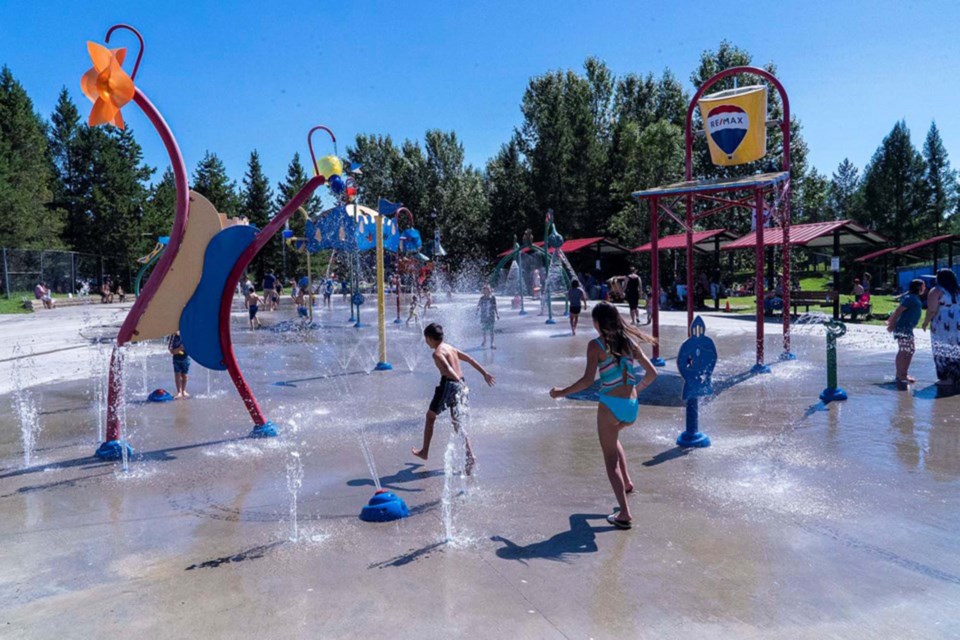Hot weather rolled into the province last week, finishing off the month as one of the hottest Augusts on record in Alberta.
Over the weekend much of the eastern part of the province was under a heat warning, with temperatures hitting 38 C in the southern parts of Alberta.
Kyle Fougere, meteorologist with Environment and Climate Change Canada, said in the 12 areas of the province that calculate climatology statistics, they all experienced one of the top five hottest Augusts on record.
"Edmonton and Grande Prairie had their warmest August ever recorded," Fougere said.
But the entire summer wasn't extremely warm, the expert said.
"We had a tale of two summers — it started off as a colder, wetter summer," Fougere said.
In June and July, temperatures were cooler and wetter than normal but by the end of July a ridge of high pressure rolled in, which supressed clouds and thunderstorm activity.
"So, you get clear skies, warm temperatures, and it tends to build over time. So, when you do have a persistent ridge of high pressure that's in place for a long period of time, you tend to get a lot of heat, and so that was what we really saw for the second half of the summer," Fougere said.
This summer comes on the heels of Alberta's hottest summer on record in 2021, and some places in the province still saw the mercury come close to last year's record temperatures. Calgary experienced its third hottest summer on record, Fougere said.
"[We had] two consecutive years where it was quite hot, and we did have some pretty significant heat events," Fougere said, adding these extreme weather events are going to continue to happen as the climate warms.
Research published in May of this year by the journal Science Advances found the heat wave experience last year in North America was one of the most extreme ever recorded globally. Only five heat waves since the 1960s were more extreme, based on how they surpassed the normal summertime averages in the previous 10 years.
The paper shows that extreme temperatures are getting hotter and rising with climate change.
The study found that by around 2080, heat waves like the one in 2021 have a one-in-six chance of happening every year in western North America.
According to a report published by the World Economic Forum, recent studies show that hospital emergency-room visits increase by at least 10 per cent on days when temperatures reach or exceed the top five per cent of the average temperature range for the given region.
Fougere said the province won't experience record-breaking temperatures every year, but the frequency of them will continue to increase in the future.
"There will obviously be some variability, but on average, we are seeing more heat events, the heat events we're having have a greater magnitude, and our summers are getting hotter," Fougere said.
In Canada, temperatures are increasing more quickly than in other places around the world, Fougere said, at roughly double the global mean average rate. Because of Canada's northern location and its distance from the equator compared to other countries, there is more warming happening.
"In the west in Alberta, and then in areas of the Arctic, that's where we're starting to see a lot of the greatest warming ... the data does show we are getting warmer, we are starting to see more heat events," Fougere said.
And the heat events have a greater magnitude than they did in the past, Fougere said, which will result in record-setting temperatures moving forward.
Researchers have a higher confidence in the connection between wildfires, heat events, and increased rain and climate change, Fougere said, and events such as thunderstorms have a weaker connection.
"They have done attribution studies that have shown that things like the Fort McMurray fire, the heat event that we had last year, and even the Alberta floods in 2013, all of those were impacted by global warming and it did have an influence on the magnitude of those events," Fougere said.
September started off hot in the province and set some heat records for the year, with temperatures soaring past the 30 C in many regions, but as the month goes on temperatures and rainfall levels are expected to settle closer to seasonal averages.


-jf-c.jpg;w=120;h=80;mode=crop)

